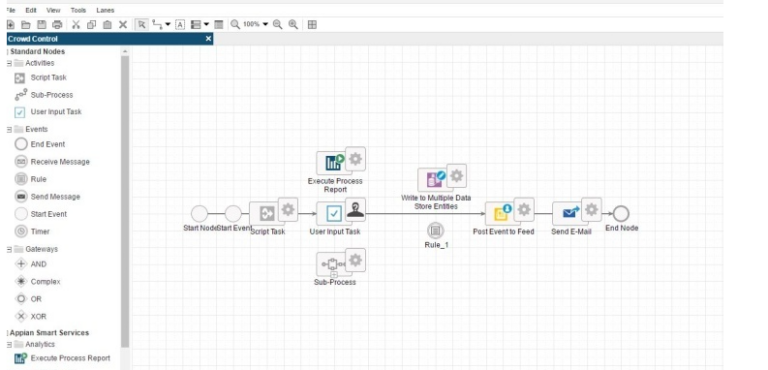Microsoft Power Platform & Microsoft Fabric Implementation
Analytica, an SBA Certified 8a small business, is leading the design, development, and operations and […]

Analytica, an SBA Certified 8a small business, is leading the design, development, and operations and […]

Implementing federal low-code and no-code solutions using platforms such as Appian, Microsoft Power Automate, and H2O AI to provide federal clients higher productivity with the ability to build applications quickly that are built once and run anywhere.

The Advanced Technology Academic Research Center (ATARC), a leading Government Private / Public Partnership, has a goal to accelerate the adoption of AI and data analytics best practices across government and industry that increase efficiency and reduce cost.

Analytica worked with the DHA’s Analytics and Evaluation Division (J-5) to provide centralized analytics services, data reporting processes, and automation. Our team successfully automated or semi-automated data collection and reporting, often resulting in the development of dashboards that aid leadership in making critical, enterprise-wide decisions. We modeled and forecasted various aspects of cost through the MHS enterprise and specific incidents such as the COVID-19 pandemic. This work aided in an increase in the reliability, sustainability, and quality of DHA data products.

Analytica supports our client’s critical heterogeneous 7 Petabyte (PB) federal enterprise data warehouse environment with federal data architecture and engineering administration support across structured, semi-structured, and unstructured data located in on-prem and cloud environments from over 52 institutional Internal Revenue Service (IRS) databases. These databases include data from all the core IRS systems, such as the Modernized e-File (MeF), Return Review Program (RRP), Customer Account Data Engine 2 (CADE 2), and Account Management Services (AMS).

Analytica supports the Centers for Medicare and Medicaid Services (CMS) with federal program integrity support analysis, oversight, and compliance in support of Medicare and Medicaid. Our team-integrated team applies both subject matter and technology expertise to help combat public sector fraud, waste, and abuse, In collaboration with our client, we help provide innovations around case prioritization, selection, and applying risk-based analytics to program integrity reviews.

Enterprise-level business intelligence, data management, and analytics have evolved materially over the last few years. However, many organizations still maintain highly siloed data with limited self-service and enterprise-level data management and analytics capabilities. Analytica was engaged by a federal government client, the Department of Homeland Security (DHS), to help modernize their enterprise analytics capabilities and support the analysis of hundreds of millions of records from across DHS agencies. The client faced difficulty linking immigrant identities from the disparate records stored in more than four dozen separate data silos. Downstream, this hindered their ability to perform timely mission critical enterprise-level planning, prescriptive, and predictive analytics.

Analytica supports federal agencies to rapidly adapt to legislative changes by applying a data-driven consulting approach and implementing technology systems allowing them to comply with new federal mandates and programs, such as the Payment Integrity Information Act (PIIA). For the Commodity Futures Trading Commission (CFTC) we are implementing processes and web applications that automate payment integrity models, reporting, and anomaly detection.

Analytica is supporting HHS’s Centers for Medicare and Medicaid Services to address challenges with their on-premise data warehouse and analytics environment that are limiting their ability to serve stakeholders and constituents. Our team is designing and building a federal cloud data analytics platform and environment that supports broader data access, self-service capabilities and integration across numerous other data sources.

Analytica’s engineering solutions group implemented a rapid open source application modernization for our client, the Centers for Disease Control and Prevention (CDC) Office of Science Quality (OSQ). Through leveraging open source technologies and an Agile SAFE project management framework we designed, developed, and implemented an enterprise publishing platform that supported clearing and publishing CDC’s Research and Non-research projects on the web.

Analytica is supporting the Centers for Medicare and Medicaid Services (CMS) Office of Information Technology (OIT) to design and implement a federal data strategy and governance approach to support enterprise cloud environments. As part of work we are helping adapt data architecture, design standards and governance frameworks to support innovations around cloud based data management and analytics.

Analytica leads the modernizing of federal applications and web platforms that incorporate a strong human centered design and focus on customer experience and citizen engagement as part of building modern data-centric, federal enterprise applications. Our client, the Internal Revenue Service, had an mission critical web application that was data-centric and had significant potential, but had low citizen and stakeholder engagement.

The Patient Protection and Affordable Care Act (ACA) created new health insurance exchanges that began processing applications for coverage in 2014, creating large volumes of heterogenous data across Federal and State data sources. Our client, the Internal Revenue Service, is accountable for calculating and applying premium tax credits (PTC) to individuals and small businesses based on taxable income and insurance throughout the coverage period. They also use this data for matching and analysis to produce accurate measures of tax reporting, filing and payment compliance as well as decision-making and reporting to such external stakeholders as the Treasury, Congress, and the Government Accountability Office.

Analytica is supporting the development of complex artificial intelligence and machine learning model development for the Securities and Exchange Commission (SEC) to combat insider trading and financial fraud. Our work applying artificial intelligence / machine learning for regulatory enforcement provides the SEC with the ability to reduce costs for regulatory enforcement while providing more accurate, actionable intelligence for enforcement.
"*" indicates required fields